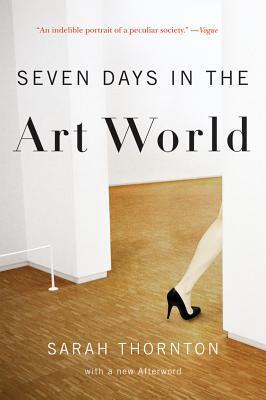Sarah Thornton

Seven Days in the Art World
Sarah Thornton
Named one of the best art books of 2008 by The New York Times and The Sunday Times [London]: “An indelible portrait of a peculiar society.”—Vogue
The art market has been booming. Museum attendance is surging. More people than ever call themselves artists. Contemporary art has become a mass entertainment, a luxury good, a job description, and, for some, a kind of alternative religion. In a series of beautifully paced narratives, Sarah Thornton investigates the drama of a Christie's auction, the workings in Takashi Murakami's studios, the elite at the Basel Art Fair, the eccentricities of Artforum magazine, the competition behind an important art prize, life in a notorious art-school seminar, and the wonderland of the Venice Biennale. She reveals the new dynamics of creativity, taste, status, money, and the search for meaning in life. A judicious and juicy account of the institutions that have the power to shape art history, based on hundreds of interviews with high-profile players, Thornton's entertaining ethnography will change the way you look at contemporary culture. 8 illustrations.

Tits Up: What Sex Workers, Milk Bankers, Plastic Surgeons, Bra Designers, and Witches Tell Us about Breasts
Sarah Thornton
An innovative investigation of the five strange worlds that worship women’s chests
After years of biopsies, best-selling author Sarah Thornton made the difficult decision to have a double mastectomy, but after her reconstructive surgery, she was perplexed: What had she lost? And gained? An experienced sleuth, she resolved to venture behind the scenes to uncover the social and cultural significance of breasts.
Tits Up reveals the diverse truths of mammary glands from the strip club to the operating room, from the nation’s oldest human milk bank to the fitting rooms of bra designers. Thornton draws insights from plastic surgeons, lactation consultants, body-positive witches, lingerie models, and “free the nipple” activists to explore the status of breasts as emblems of femininity.
She examines how women’s chests have become a billion-dollar business, as well as a stage for debates about race, class, gender, and desire. Everywhere she turns, Thornton encounters chauvinistic myths that quietly justify restrictions to women’s bodily autonomy and diminish women's political status.
Blending sociology, reportage, and personal narrative with refreshing optimism and wit, Thornton has one overriding ambition―to liberate breasts from centuries of patriarchal prejudice.